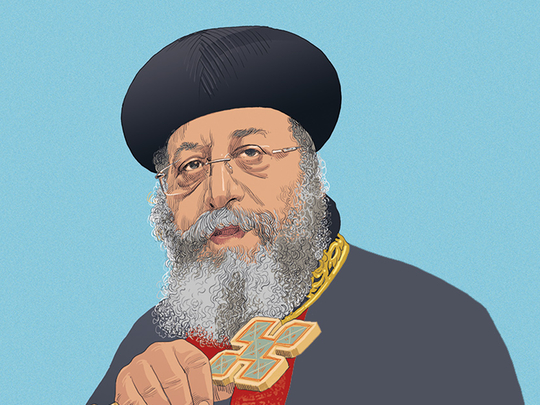
Spare a thought today for Pope Tawadros II, the leader of the largely Egypt-based Coptic church and a man who led followers virtually under siege. While the Church of Rome is the mainstream, worldwide and leading sect of Catholicism with roughly a billion followers, in Egypt, less than 0.5 per cent of the population is Roman Catholic. There, about 10 per cent of the population is Christian, most of those are Copts, with Tawadros II being their spiritual leader.
It’s therefore significant that Pope Francis I, the spiritual leader of the Roman Catholic church, met the Coptic church prelate in Cairo. Above anything else — and with Shaikh Ahmad Mohammad Al Tayeb, the grand imam of the mosque of Al Azhar, also joining the two on Francis’ visit — it sends a loud and clear message of support for Tawadros and his followers. And after the events of these past months, where Tawadros’ followers have become targets, the meeting takes on monumental proportions in ecclesial terms.
Palm Sunday — always celebrated one week before Easter Sunday, the most important day on the Christian religious calendar — fell on April 9 this year. Unlike most Christian feasts, which are marked on set days, Easter remains the only Christian holiday set by the Moon, falling on the first Sunday on or after the vernal equinox, which was set as March 21.
The determination of the date for Easter was set in 325 at the Council of Nicaea, a gathering of Christian leaders to try and settle practical and religious disputes in the relatively young and struggling church. That same gathering also tried to deal the followers of St Mark, who had developed their own theological interpretations of scriptures even though it was broadly aligned with the mainstream teachings as a whole. In essence, that’s when the Coptic church of St Mark became a separate Catholic franchise.
But back to Palm Sunday. On April 9, just three weeks ago, bombs exploded at Coptic services in Alexandria and Tanta, killing 47 people and wounding more than 100 more. As with any attack by cowards on any target when unarmed and defenceless people gather, this was a dastardly act, and one that was claimed by Daesh (the self-proclaimed Islamic State of Iraq and the Levant).
Sadly, it was just the latest atrocity to be inflicted upon Tawadros II’s followers. One bomber struck at the church gates of St Mark’s Cathedral as Tawadros was leading the Alexandria service. In the Nile delta city of Tanta, the bomber slipped past security into the front pews of the church, turning the religious celebration into a bloodbath.
Last December, Daesh had signalled its intention to target the Coptic church and a bomb at a Cairo church killed 28. In February, hundreds of Copts fled their homes in the Sinai Peninsula after a concerted campaign of assassinations and intimidation targeted the church.
It’s the deepest challenge the 65-year-old Tawadros has faced since he was enthroned as the 118th Pope of Alexandria and Pope of the See of St Mark in November 2012. That enthronement took place at the Cathedral of St Reweiss in Abnassiya, Cairo.
According to his official biography, Tawadros II was born Wagih Sobhy Baky Soliman in November 1952, in Mansoura. His father was an irrigation engineer and his family moved around during his childhood from Mansoura to Sohag and then to Damanhour.
Tawadros received his bachelor’s degree in Pharmacy in 1975 from Alexandria University and earned a fellowship for the World Health Organisation from the British International Health Institute in England. He attended the Coptic Seminary and graduated in 1983. He then worked as a manager in a pharmaceutical company in Damanhour that was owned by Egypt’s Ministry of Health.
Ever since his early days, Tawadros’ life has always revolved around the Coptic church and the life of monasticism. He entered the Monastery of St Pishoy in Wadi Al Natroun in 1986 and remained a brother for two years. He was ordained a priest in December 1989. He rose quickly, becoming a bishop in 1997. He succeeded Pope Shenouda III, who died in March 2012 and who had been pontiff for more than four decades.
The day after the Palm Sunday attacks, a three-month state of emergency was declared — the first such move since President Abdul Fatah Al Sissi came to power in 2013 — which increased the powers of the Egyptian security forces. Under Egypt’s new state of emergency, the government is granted expanded powers, including the ability to raid homes without a warrant, curtail political opposition, convene emergency courts, curb press freedoms and monitor private communications.
Daesh also threatened that it would carry out more attacks, with Al Sissi countering that the war against the terrorists would be “long and painful”.
Pope Francis’ visit was “very significant” for both Catholic and Orthodox communities, said bishop Anba Angaelos, the head of the Coptic Orthodox church in the United Kingdom. “It’s a wonderful chance for Francis to practically show support for Christians in Egypt and in the Middle East.”
The bishop has claimed that lists of churches and individuals have been released as “desirable targets” by terrorist groups. “Innocent men, women and children have had their lives brutally and tragically ended for no other reason except that they are Christians.”
For Tawadros, the visit of the Roman Catholic pontiff will provide an opportunity to highlight the peace-loving nature of his church, and it will send a clear message that his followers are not alone, have the support of other Catholic churches — and have the backing of the entire Egyptian security apparatus in its efforts to eradicate Daesh there.









